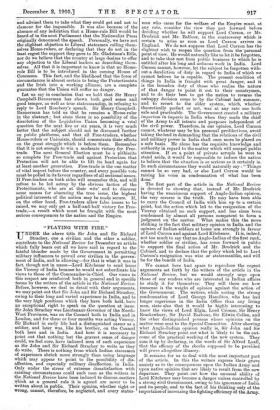We cannot here hnd space to reproduce the cogent arguments
set forth by the writers of the article in the National Review, but we would strongly urge upon those of our readers who are interested in Indian affairs to study it for themselves: They will there see how immense is the weight of opinion against the action of the Government. The writers, while noting the strong condemnation of ',Ord George Hamilton, who has had longer experience in the India Office than any living man, state also that it would be highly interesting to know the views of Lord Elgin, Lord Cromer, Sir Henry Brackenbury, Sir David Barbour, Sir Edwin Collen, and the other distinguished persons whose opinions on the matter were sent to the Special Committee. After showing what Angle-Indian opinion really. is, Sir John and Sir Richard Strachey point out what is likely to be the out- come of the practical working of the new system. They sum it up by declaring, in the words of Sir Alfred Lyall, that the efficacy of the checks supposed to be provided will prove altogether illusory.
It remains for us to deal with the most important part of the article. In this the writers express their grave anxiety as to the consequences upon the Indian Army and upon native opinion that are likely to result from the new departure. They point out how the unusual ability of Lord Kitchener may become a danger unless controlled by a strong civil Government, owing to his ignorance of India and its.people,and, to the fact of his thinking only of the importance of increasing the fighting efficiency of the Army.



































































 Previous page
Previous page